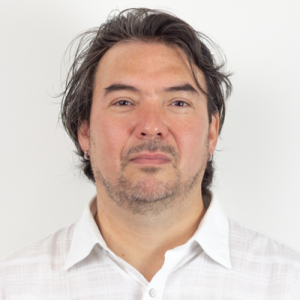Dr Alan Yusen Ley Cooper

|
EL 2 Leadership Program
|
| Role | Activity Leader, Airborne Electromagnetics |
|---|---|
| Agency | Geoscience Australia |
| Location | Canberra/Ngunnawal Country, Australian Capital Territory |
Joining the Australian Public Service
I chose to join the APS because it allowed me to be part of a world-class team of experts at Geoscience Australia, renowned for its expertise in geoscience. This role not only fuelled my professional growth, but also provided a work-family balance that was crucial for raising my 2 young boys.
Describe your first APS role.
I first joined the APS as a Geophysicist at Geoscience Australia where I provided support to multi-disciplinary project teams. My role involved mapping and characterising groundwater systems, contributing to the department’s environmental initiatives and further developing its expertise.
I was in the early to mid-stages of my career, and had gained valuable experience in both academia and industry. I had also completed my PhD. This equipped me with a solid foundation of technical knowledge and skills, and I was ready to take on new challenges.
Stewardship
What does stewardship mean to you?
I like to think of stewardship as the responsibility, management and care of something that has been entrusted to me, in my case data and knowledge. Stewardship comes with the duty and obligation to act as a custodian, ensuring that this data – which is public knowledge – is maintained and used sustainably and ethically.
Why do you feel stewardship is important?
In the context of data and knowledge, stewardship is crucial for public servants. This is because it ensures that information is managed responsibly and used effectively to serve the public interest.
Good stewardship protects the integrity and confidentiality of data, ensuring its legacy. It also promotes transparency and facilitates informed decision-making, which is essential for building trust and delivering quality public services.
Was there a defining moment or person who influenced your thinking on this?
Despite the clichés attached to this phrase ‘defining moment’, I genuinely believe I’ve had the privilege of standing on the shoulders of some real geophysical giants. They were trailblazers who understood the importance of preserving and making data collected by government agencies available for future generations.
Describe how you act as a steward in your current role.
My team and I are the custodians of some of the largest geophysical datasets in the world. We ensure that their acquisition has high technical standards, and that the data is curated and archived for legacy purposes.
We do this by:
- authoring scientific papers, report writing, and preparing documents for presentation at international and international conferences
- conducting internal and external peer-review, and providing recommendations
- initiating and driving ongoing collaborations between my section and other teams across the agency and externally, with industry and research partners
- liaising, engaging, and collaborating with other internal or external professionals.
In my role I also support and promote innovation across areas including computer code development, data acquisition, land access, data processing and delivery and stakeholder engagement.
What professional experiences or achievements are you most proud of?
I’ve led the world’s largest airborne electromagnetic survey ever undertaken. This survey is significantly enriching our knowledge of Australia’s subsurface.
The survey is an ambitious endeavour set to canvas the entire continent by capturing high-resolution, multipurpose data, uncovering potential hidden mineral deposits and crucial groundwater resources, and revealing many other unknowns beneath our feet.
What is a legacy you hope to leave in your current role and when you finish your career in the APS?
I would like to be remembered for enabling the acquisition of a multipurpose dataset and its corresponding models that will enable its use for a generation of mineral discoveries, environmental management and conservation purposes.
What professional advice would you give your younger self?
I would suggest not taking some things personally and reassuring myself that my technical knowledge and out-of-APS experience are valuable and bring a great deal to the public service.
APS Academy program participation
Which program have you participated in, and what were your reasons for applying?
I took part in the 2023–24 cohort of the EL 2 Leadership Program, as I wanted to further develop my capacities in managing, leading and influencing a range of people and groups.
I was moving from a role where I was influencing from a technical perspective, into a role where influence is also achieved by sitting at the table and contributing to decision making.
Describe your program experience.
I personally enjoyed the leadership module, and the material and reflections around the future of APS and integrity. I really engaged with how we as human beings respond when faced with ethical issues and challenges.
I found the talks from invited speakers and the material put together for program participants to be incredibly useful.
How has this experience contributed to your current role?
It was a good ride, and I enjoyed several aspects of the program. It has made me more engaged with my work in the APS and why I do it, which is much more than just individual economic reward.



